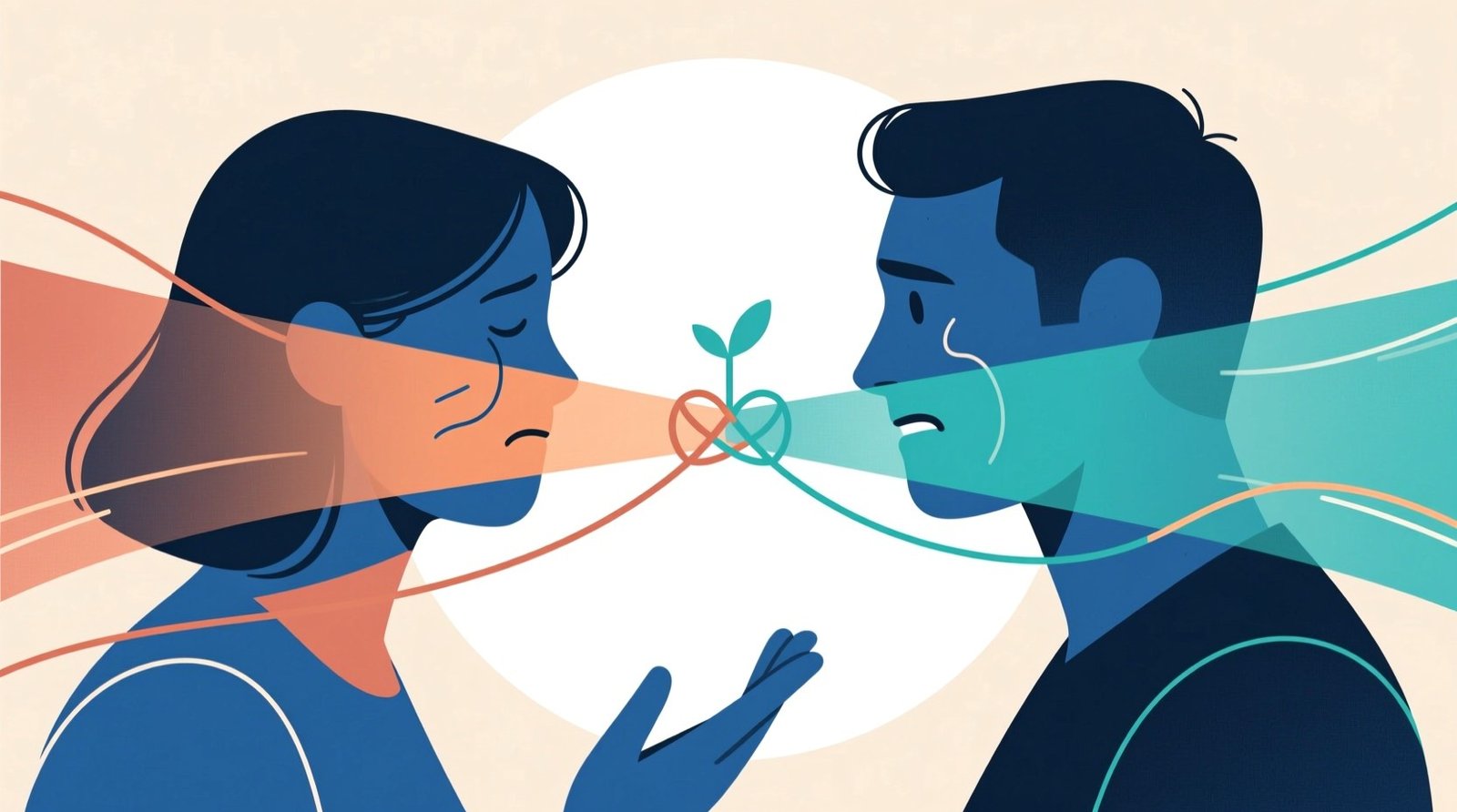Emotional intimacy is a fundamental aspect of any successful and fulfilling relationship. It encompasses the ability to be vulnerable, open, and transparent with your partner, allowing for a deep and meaningful connection to flourish. This level of intimacy goes beyond physical attraction or shared interests; it involves a profound understanding and acceptance of one another’s emotions, thoughts, and experiences.
At its core, emotional intimacy is about creating a safe and nurturing space where both partners can express themselves authentically without fear of judgment or rejection. It requires active listening, empathy, and a willingness to validate and support each other’s feelings. When emotional intimacy is present, couples can communicate openly and honestly, fostering trust, understanding, and mutual respect.
The importance of emotional intimacy in maintaining a healthy relationship cannot be overstated. It serves as a foundation for building a strong and lasting bond between partners. When couples are emotionally intimate, they feel secure and connected, which allows them to weather the storms that inevitably arise in any relationship.

Emotional intimacy also plays a vital role in enhancing the overall satisfaction and happiness within a partnership. It deepens the sense of intimacy and closeness, leading to increased levels of trust, passion, and fulfillment. When both partners feel seen, heard, and understood on an emotional level, it creates a profound sense of belonging and acceptance.
Building and deepening emotional intimacy requires intentional effort and commitment from both partners. It involves cultivating self-awareness, practicing effective communication skills, and prioritizing quality time together. Here are a few practical tips to help you foster emotional intimacy in your relationship:
Practice active listening:
Make a conscious effort to truly listen to your partner without interrupting or judging. Show genuine interest in their thoughts and feelings, and validate their experiences.
Share your emotions:
Be open and honest about your own emotions, fears, and insecurities. Vulnerability is key to building emotional intimacy.
Create rituals of connection:
Establish regular activities or routines that allow you to connect and bond on a deeper level. This could be a weekly date night, a shared hobby, or simply setting aside dedicated time for meaningful conversations.
Show appreciation:
Express gratitude and appreciation for your partner regularly. Acknowledge their efforts, strengths, and qualities that you admire.
Seek professional help if needed:
If you’re struggling to build emotional intimacy or facing challenges in your relationship, don’t hesitate to seek the guidance of a couples therapist. They can provide valuable insights and tools to help you navigate your journey towards deeper emotional connection.
Remember, emotional intimacy is a continuous process that requires ongoing effort and commitment. As you embark on this journey, be patient and compassionate with yourself and your partner. With time and dedication, you can create a relationship filled with love, trust, and emotional fulfillment.

Emotional intimacy is not only crucial for romantic relationships but also for friendships and familial bonds. It is through emotional intimacy that individuals can develop a sense of belonging and acceptance, knowing that they can be their authentic selves without fear of judgment or rejection. This level of intimacy allows for open and honest communication, leading to deeper connections and a greater understanding of one another.
In a romantic relationship, emotional intimacy plays a vital role in keeping the flame of love alive. It is the glue that holds couples together during challenging times and strengthens their bond during moments of joy and celebration. When partners are emotionally intimate, they can lean on each other for support, provide comfort and reassurance, and navigate through life’s ups and downs as a united front.
Moreover, emotional intimacy fosters a sense of security and stability within a relationship. When individuals feel emotionally connected to their partner, they experience a sense of safety and trust, knowing that they can rely on their partner to be there for them in times of need. This security allows them to take risks, be vulnerable, and share their deepest fears and desires without the fear of being judged or rejected.
Furthermore, emotional intimacy enhances the overall satisfaction and fulfillment within a relationship. When partners feel emotionally connected, they are more likely to experience higher levels of happiness, contentment, and overall relationship satisfaction. This is because emotional intimacy creates a space where partners can feel truly seen, heard, and understood, leading to a deep sense of fulfillment and fulfillment in the relationship.
In conclusion, emotional intimacy is a significant aspect of any meaningful relationship. It is through emotional intimacy that individuals can develop a profound understanding and connection with one another, fostering trust, vulnerability, and a sense of closeness. Whether in romantic relationships, friendships, or familial bonds, emotional intimacy is essential for building and maintaining healthy and fulfilling connections.
Understanding Emotional Intimacy
Before we dive deeper into the topic, let’s define emotional intimacy. Emotional intimacy refers to the ability to be open, vulnerable, and emotionally connected with your partner. It involves sharing your fears, dreams, and insecurities without the fear of judgment or rejection.
Emotional intimacy is built through consistent communication, active listening, and empathy. It requires both partners to be present and engaged in the relationship, investing time and effort to nurture emotional connection.
Developing emotional intimacy is a gradual process that requires patience and understanding. It is not something that can be achieved overnight, but rather a journey that couples embark on together. It involves creating a safe and non-judgmental space where both partners feel comfortable expressing their deepest thoughts and feelings.
One of the key elements in building emotional intimacy is effective communication. This means being able to express oneself honestly and openly, while also being a good listener. It involves actively engaging in conversations, asking questions, and showing genuine interest in your partner’s thoughts and experiences.

Active listening is an essential skill in developing emotional intimacy. It involves not only hearing what your partner is saying but also understanding their emotions and underlying meaning. It requires being fully present in the moment and giving your undivided attention to your partner.
Empathy is another crucial aspect of emotional intimacy. It involves putting yourself in your partner’s shoes and trying to understand their perspective. By showing empathy, you validate your partner’s feelings and let them know that you are there for them, no matter what.
Building emotional intimacy also requires vulnerability. It means being willing to share your deepest fears, insecurities, and desires with your partner. It involves letting go of the fear of judgment or rejection and trusting that your partner will accept and support you.
Nurturing emotional intimacy requires ongoing effort and dedication. It involves creating rituals and routines that allow you and your partner to connect on a deeper level. This could be anything from having regular date nights to engaging in activities that you both enjoy.
Remember, emotional intimacy is not a destination but a continuous journey. It requires constant nurturing and attention from both partners. By investing in emotional intimacy, you create a strong foundation for a fulfilling and lasting relationship.
The Importance of Emotional Intimacy in Maintaining a Healthy Relationship
Emotional intimacy plays a pivotal role in maintaining a healthy and fulfilling relationship. It fosters trust, empathy, and understanding between partners, creating a safe space for open and honest communication. When emotional intimacy is present, couples are more likely to resolve conflicts effectively, support each other’s personal growth, and experience greater overall relationship satisfaction.
Moreover, emotional intimacy allows couples to truly know and understand each other on a deeper level. It involves being vulnerable and sharing one’s true thoughts, feelings, and desires with their partner. This level of openness and authenticity helps to build a strong foundation of trust and mutual respect, which is essential for a long-lasting and meaningful relationship.
When partners feel emotionally connected, they are more likely to feel secure in their relationship. They know that they can rely on their partner for support, understanding, and validation. This sense of security creates a safe and nurturing environment where both individuals can thrive and grow together.

Furthermore, emotional intimacy helps to create a sense of belonging and togetherness. It allows couples to feel deeply connected and united, even in the face of challenges and adversity. When partners are emotionally intimate, they are more likely to approach problems as a team, working together to find solutions and overcome obstacles.
On the other hand, without emotional intimacy, relationships can become stagnant, leading to feelings of loneliness, frustration, and disconnection. When partners are unable to share their true selves and be vulnerable with each other, they may start to feel misunderstood or unappreciated. This lack of emotional connection can create distance between partners and erode the foundation of their relationship.
By exploring the depths of emotional intimacy, couples can cultivate a deeper bond and experience the full richness of love and connection. This can be achieved through various means, such as engaging in deep conversations, expressing gratitude and appreciation for each other, and actively listening and validating each other’s feelings. It requires both partners to be willing to be vulnerable and open with each other, creating a space where both individuals feel safe to share their innermost thoughts and emotions.
In conclusion, emotional intimacy is a vital component of a healthy and fulfilling relationship. It fosters trust, empathy, and understanding, allowing couples to navigate challenges, support each other’s personal growth, and experience deep connection and love. Without emotional intimacy, relationships can become stagnant and disconnected. Therefore, it is important for couples to prioritize and nurture emotional intimacy in order to maintain a strong and thriving relationship.
Furthermore, effective communication involves not only listening and validating emotions but also expressing oneself clearly and assertively. It is crucial to be able to express your own needs, desires, and boundaries in a relationship. By doing so, you create a safe and open environment where both partners feel heard and understood.
Another aspect of communication that contributes to building emotional intimacy is nonverbal communication. Nonverbal cues, such as body language, facial expressions, and touch, can convey emotions and deepen the connection between partners. For example, a gentle touch or a warm hug can communicate love and support without the need for words.
In addition to verbal and nonverbal communication, the use of technology in communication has become increasingly important in today’s digital age. While technology can facilitate communication in long-distance relationships or during busy schedules, it is crucial to be mindful of its potential drawbacks. The overreliance on texting or social media can hinder emotional intimacy as it lacks the depth and nuance of face-to-face interactions.
Moreover, effective communication also involves conflict resolution. Disagreements and conflicts are inevitable in any relationship, but how they are handled can either strengthen or weaken emotional intimacy. It is important to approach conflicts with a willingness to understand each other’s perspectives, compromise, and find mutually satisfactory solutions. By doing so, couples can build trust, deepen their emotional connection, and grow together.
Overall, communication plays a vital role in building emotional intimacy in relationships. It requires active listening, validation of emotions, clear expression of needs and boundaries, nonverbal cues, mindful use of technology, and effective conflict resolution. By prioritizing communication and creating a safe and open space for emotional expression, couples can cultivate a deeper sense of intimacy and strengthen their bond.
Strategies for Enhancing Communication to Deepen Intimacy
Here are some practical strategies for enhancing communication and deepening emotional intimacy in your relationship:
- Set aside dedicated time for meaningful conversations without distractions.
- Practice active listening by giving your full attention and avoiding interruptions.
- Use “I” statements to express your feelings and needs, fostering open and non-confrontational communication.
- Show empathy and understanding by acknowledging and validating your partner’s emotions.
- Engage in regular check-ins to discuss the state of your emotional connection and address any concerns or issues.
- Developing effective communication skills is essential for building and maintaining a healthy relationship. When couples communicate effectively, they can express their thoughts, emotions, and needs in a way that fosters understanding and connection. By setting aside dedicated time for meaningful conversations without distractions, couples can create a safe space where they can openly express themselves without interruptions. This dedicated time allows for deeper and more meaningful conversations, where both partners can feel heard and understood.
- Active listening is another crucial aspect of enhancing communication and deepening intimacy. When practicing active listening, individuals give their full attention to their partner, showing genuine interest in what they have to say. This involves avoiding distractions, such as phones or other devices, and focusing on the speaker’s words and non-verbal cues. By actively listening, couples can foster a sense of being heard and valued, which strengthens emotional intimacy.
- Using “I” statements is a powerful tool for expressing feelings and needs in a non-confrontational manner. By using “I” statements, individuals take responsibility for their emotions and avoid blaming or criticizing their partner. This approach encourages open and honest communication, as it focuses on personal experiences and perspectives rather than making assumptions or generalizations. “I” statements also promote empathy and understanding, as they allow partners to better understand each other’s emotions and needs.
- Empathy and understanding are essential components of deepening emotional intimacy. When partners show empathy, they demonstrate that they genuinely care about their partner’s emotions and experiences. This can be done through active listening, validating their partner’s feelings, and offering support and comfort. By acknowledging and validating their partner’s emotions, couples create a safe and nurturing environment where emotional intimacy can flourish.
- Regular check-ins are crucial for maintaining emotional connection and addressing any concerns or issues that may arise. By scheduling regular conversations to discuss the state of their emotional connection, couples can proactively address any areas of concern or potential conflicts. This allows them to work together to find solutions and strengthen their bond. Regular check-ins also provide an opportunity for partners to express gratitude and appreciation for each other, further deepening emotional intimacy.

By implementing these strategies, couples can create a strong foundation for emotional intimacy and strengthen the bond with their partner. Effective communication is a key ingredient in building and maintaining a healthy relationship, and by practicing these strategies consistently, couples can enhance their connection and deepen their emotional intimacy.
Building emotional intimacy requires open and honest communication, trust, and vulnerability. It involves sharing one’s deepest thoughts, fears, and desires with a partner, knowing that they will be met with understanding and acceptance. This level of emotional connection allows individuals to feel seen, heard, and validated, fostering a sense of belonging and security within the relationship.
Emotional intimacy goes beyond physical attraction or shared interests; it involves a deep emotional bond that allows individuals to connect on a profound level. It requires active listening, empathy, and the ability to provide emotional support during both the highs and lows of life. When partners feel emotionally connected, they are more likely to weather the storms of life together, supporting and uplifting each other along the way.
Furthermore, emotional intimacy plays a crucial role in the overall well-being of individuals. Research has shown that individuals in emotionally intimate relationships experience lower levels of stress, anxiety, and depression. They have a greater sense of self-worth and are more resilient in the face of adversity. This is because emotional intimacy provides a safe space for individuals to express their emotions and seek comfort and understanding from their partner.
In addition to its impact on mental health, emotional intimacy also contributes to relationship stability. When partners feel emotionally connected, they are more likely to communicate effectively, resolve conflicts in a healthy manner, and maintain a strong bond over time. This can help prevent the erosion of trust and the buildup of resentment, which are common contributors to relationship dissatisfaction and eventual breakdown.
However, building and maintaining emotional intimacy requires effort and commitment from both partners. It requires a willingness to be vulnerable, to let down walls, and to actively engage in the emotional needs of one another. It involves setting aside dedicated time for meaningful conversations, expressing appreciation and gratitude, and continuously working on deepening the emotional connection.
In conclusion, emotional intimacy is a vital component of a healthy and fulfilling relationship. It not only impacts the quality of the relationship but also has profound effects on mental health and relationship stability. By prioritizing emotional intimacy, individuals can experience greater emotional well-being, overall life satisfaction, and a stronger, more resilient partnership.
Practical Tips for Building Emotional Intimacy
Building emotional intimacy requires conscious effort and commitment from both partners. Here are some practical steps and tips to cultivate emotional intimacy:
-
Engage in regular date nights or activities that allow you to connect on a deeper level.
-
Share your thoughts, dreams, and aspirations with each other.
-
Express gratitude and appreciation for your partner regularly.
-
Practice physical touch and affection, such as hugging or holding hands.
-
Be vulnerable and open about your fears and insecurities.
-
Develop active listening skills to truly understand and empathize with your partner’s emotions.
-
Engage in meaningful conversations that go beyond surface-level topics.
-
Set aside dedicated time to spend together without distractions, such as turning off phones or television.
-
Take turns planning surprises or special gestures to show your love and thoughtfulness.
-
Support each other’s individual growth and encourage personal development.
-
Seek professional help or couples therapy if needed to work through any emotional barriers or conflicts.
By incorporating these practices into your relationship, you can create a nurturing environment for emotional intimacy to flourish. Remember, building emotional intimacy is an ongoing process that requires consistent effort and communication. It is a journey that can deepen your connection and strengthen your bond as a couple.

Deepening Relationship Bonds
Deepening relationship bonds involves going beyond surface-level interactions and creating shared experiences that foster emotional intimacy. By engaging in activities together and being vulnerable with each other, couples can strengthen their emotional connection.
Importance of Shared Experiences and Vulnerability
Shared experiences play a vital role in deepening emotional intimacy. Whether it’s traveling to new places, pursuing shared hobbies, or facing challenges together, these experiences create lasting memories and strengthen the bond between partners.
Vulnerability is another crucial aspect of deepening relationship bonds. By sharing your deepest fears, insecurities, and desires, you invite your partner to do the same, creating a space for mutual trust and emotional connection.
When couples engage in activities together, they create a shared history that becomes the foundation of their relationship. Whether it’s exploring new destinations or trying out new hobbies, these shared experiences create a sense of togetherness and strengthen the emotional bond between partners. For example, a couple who goes on a hiking trip together not only enjoys the physical activity but also overcomes challenges, supports each other, and creates memories that they can cherish for a lifetime.
Furthermore, shared experiences provide opportunities for couples to learn more about each other. Through these activities, couples can discover new sides of their partner’s personality, interests, and values. This deeper understanding leads to a greater sense of connection and empathy, as partners become more attuned to each other’s needs and desires.
Alongside shared experiences, vulnerability plays a crucial role in deepening relationship bonds. When partners are open and honest about their emotions, fears, and vulnerabilities, it creates a safe space for both individuals to be their authentic selves. By sharing their deepest thoughts and feelings, couples can build trust, intimacy, and a sense of emotional security within their relationship.
Being vulnerable with your partner means allowing yourself to be seen and understood on a deeper level. It involves letting go of defenses and allowing your partner to witness your true self, including your imperfections and insecurities. This level of vulnerability fosters a sense of acceptance, as partners come to appreciate and love each other for who they truly are.
When both partners are willing to be vulnerable, it creates a reciprocal dynamic where trust and intimacy can flourish. By sharing their innermost thoughts and feelings, couples can create a deeper emotional connection and a stronger bond. This vulnerability allows for open and honest communication, leading to a greater understanding of each other’s needs and desires.
In conclusion, deepening relationship bonds requires engaging in shared experiences and being vulnerable with each other. These two elements work hand in hand to create emotional intimacy and strengthen the connection between partners. By actively participating in activities together and opening up about their emotions, couples can build a solid foundation for a long-lasting and fulfilling relationship.
Challenges in Achieving Emotional Intimacy
While emotional intimacy is essential for a healthy relationship, there are common barriers that can hinder its development. It is important to recognize and address these challenges to foster emotional intimacy effectively.
Some common barriers to emotional intimacy include:
- Fear of vulnerability and rejection
- Poor communication skills
- Past emotional trauma
- Lack of trust
Addressing and Overcoming These Challenges
To overcome these challenges and cultivate emotional intimacy, it is crucial to create a safe and supportive environment for open communication. Seeking professional help, such as couples therapy, can also provide valuable guidance and support in navigating these obstacles.
Fear of vulnerability and rejection can be a significant barrier to emotional intimacy. Many individuals are afraid to open up and share their deepest thoughts and feelings due to the fear of being judged or rejected by their partner. This fear often stems from past experiences or insecurities. To address this challenge, it is important for both partners to create a safe space where vulnerability is encouraged and accepted. This can be achieved through active listening, empathy, and non-judgmental communication.
Poor communication skills can also hinder the development of emotional intimacy. Effective communication involves not only expressing oneself but also listening and understanding one’s partner. It is essential to develop healthy communication habits, such as active listening, using “I” statements, and avoiding criticism or defensiveness. Couples can improve their communication skills by attending workshops or seeking guidance from a relationship counselor.
Past emotional trauma can have a lasting impact on one’s ability to form emotional connections. Traumatic experiences, such as betrayal or abuse, can create a fear of intimacy and trust issues. Healing from past trauma requires patience, understanding, and professional support. Individual therapy can help individuals process their emotions, develop coping mechanisms, and rebuild their ability to trust and connect with others.
Lack of trust is another common barrier to emotional intimacy. Trust is the foundation of any healthy relationship, and without it, emotional intimacy cannot flourish. Rebuilding trust requires consistent honesty, reliability, and transparency. Both partners need to be committed to rebuilding trust and understanding each other’s needs and boundaries.
In conclusion, achieving emotional intimacy requires effort and a willingness to address the barriers that hinder its development. By creating a safe and supportive environment, improving communication skills, addressing past trauma, and building trust, couples can cultivate a deeper emotional connection and strengthen their relationship.
Case Studies and Success Stories
Real-life examples of couples who have successfully improved their relationship through strengthening emotional intimacy can serve as inspiration and guidance. These case studies and success stories highlight the transformative power of emotional connection and provide practical insights for couples seeking to deepen their own emotional intimacy.
One such case study is that of Sarah and John, a married couple who had been experiencing a growing disconnect in their relationship. They found themselves constantly arguing and feeling distant from each other. Sarah and John decided to seek help from a relationship counselor who specialized in emotional intimacy.
During their sessions, Sarah and John learned about the importance of open communication and vulnerability in building emotional intimacy. They were encouraged to share their deepest fears and desires with each other, creating a safe space for honesty and understanding. Through this process, they discovered that their arguments stemmed from unresolved issues and unmet emotional needs.
With the guidance of their counselor, Sarah and John began to practice active listening and empathy towards each other. They learned to validate each other’s feelings and perspectives, even when they disagreed. This allowed them to develop a deeper understanding of each other’s experiences and fostered a sense of emotional connection.
Over time, Sarah and John noticed a significant improvement in their relationship. They felt more connected and understood by each other, leading to a decrease in arguments and an increase in overall satisfaction. They realized that by prioritizing emotional intimacy, they were able to rebuild trust and create a stronger foundation for their relationship.
Another success story is that of Mark and Emily, a couple who had been married for several years but felt like they were drifting apart. They had become caught up in their individual responsibilities and neglected to nurture their emotional connection. Feeling frustrated and disconnected, Mark and Emily decided to attend a couples retreat focused on emotional intimacy.
During the retreat, Mark and Emily participated in various exercises and workshops designed to deepen emotional connection. They learned about the importance of quality time, active appreciation, and shared experiences in fostering emotional intimacy. They also gained practical tools for effective communication and conflict resolution.
As Mark and Emily implemented what they had learned, they began to prioritize their relationship and make intentional efforts to connect emotionally. They started scheduling regular date nights and engaging in activities that they both enjoyed. They also made it a habit to express gratitude and appreciation for each other’s efforts.
The impact of these changes was profound. Mark and Emily noticed a renewed sense of closeness and affection in their relationship. They felt more connected and supported by each other, which in turn improved their overall happiness and satisfaction. They realized that by investing in their emotional intimacy, they were able to reignite the spark in their relationship and create a stronger bond.
These case studies and success stories demonstrate that emotional intimacy is not only possible but also achievable with the right tools and guidance. By learning from the experiences of others, couples can gain valuable insights and strategies for deepening their own emotional connection. Whether through counseling, retreats, or self-help resources, couples have the opportunity to transform their relationship and experience the transformative power of emotional intimacy.
One of the key aspects of navigating the journey of love and intimacy is the ability to adapt to the changing needs and desires of both partners. As individuals grow and evolve, their emotional needs may shift, and it is crucial for couples to remain attuned to these changes. This requires open and honest communication, as well as a willingness to listen and understand each other’s emotions.
Emotional intimacy is the foundation of a strong and lasting relationship. It involves being vulnerable with each other, sharing deep emotions, fears, and dreams. It is through this emotional vulnerability that couples can truly connect and understand each other on a profound level. However, building and maintaining emotional intimacy requires effort and dedication.
One way to nurture emotional intimacy is through regular and meaningful conversations. Taking the time to sit down and talk about your feelings, concerns, and aspirations can help create a safe space for both partners to express themselves. This can be done through planned check-ins or spontaneous conversations, depending on what works best for the couple.
Another important aspect of nurturing emotional intimacy is showing empathy and understanding towards your partner. This means actively listening to their needs and concerns without judgment or defensiveness. It involves validating their emotions and offering support when needed. By showing empathy, couples can create a sense of trust and safety within the relationship, allowing for deeper emotional connection.
Additionally, it is important for couples to engage in activities that foster emotional intimacy. This can include engaging in shared hobbies or interests, going on dates, or simply spending quality time together. These activities allow couples to bond and create shared memories, strengthening their emotional connection.
Lastly, it is crucial for couples to be willing to adapt and grow together. As individuals, we are constantly changing, and it is important for couples to embrace this change and evolve together. This may involve letting go of old patterns or beliefs that no longer serve the relationship and being open to new experiences and perspectives.
In conclusion, navigating the journey of love and intimacy requires ongoing effort, adaptability, and a commitment to emotional intimacy. By continuously exploring and nurturing emotional intimacy, couples can deepen their connection and create a fulfilling and lasting relationship.







[…] strengthen or weaken your bond. Kindness serves as a foundation for constructive dialogue and conflict resolution. It helps […]
Your writing is like a breath of fresh air in the often stale world of online content. Your unique perspective and engaging style set you apart from the crowd. Thank you for sharing your talents with us.
[…] its reputation for reservedness, England has a growing awareness of emotional intelligence in relationships. However, lack of emotional expression remains a stumbling block for many […]